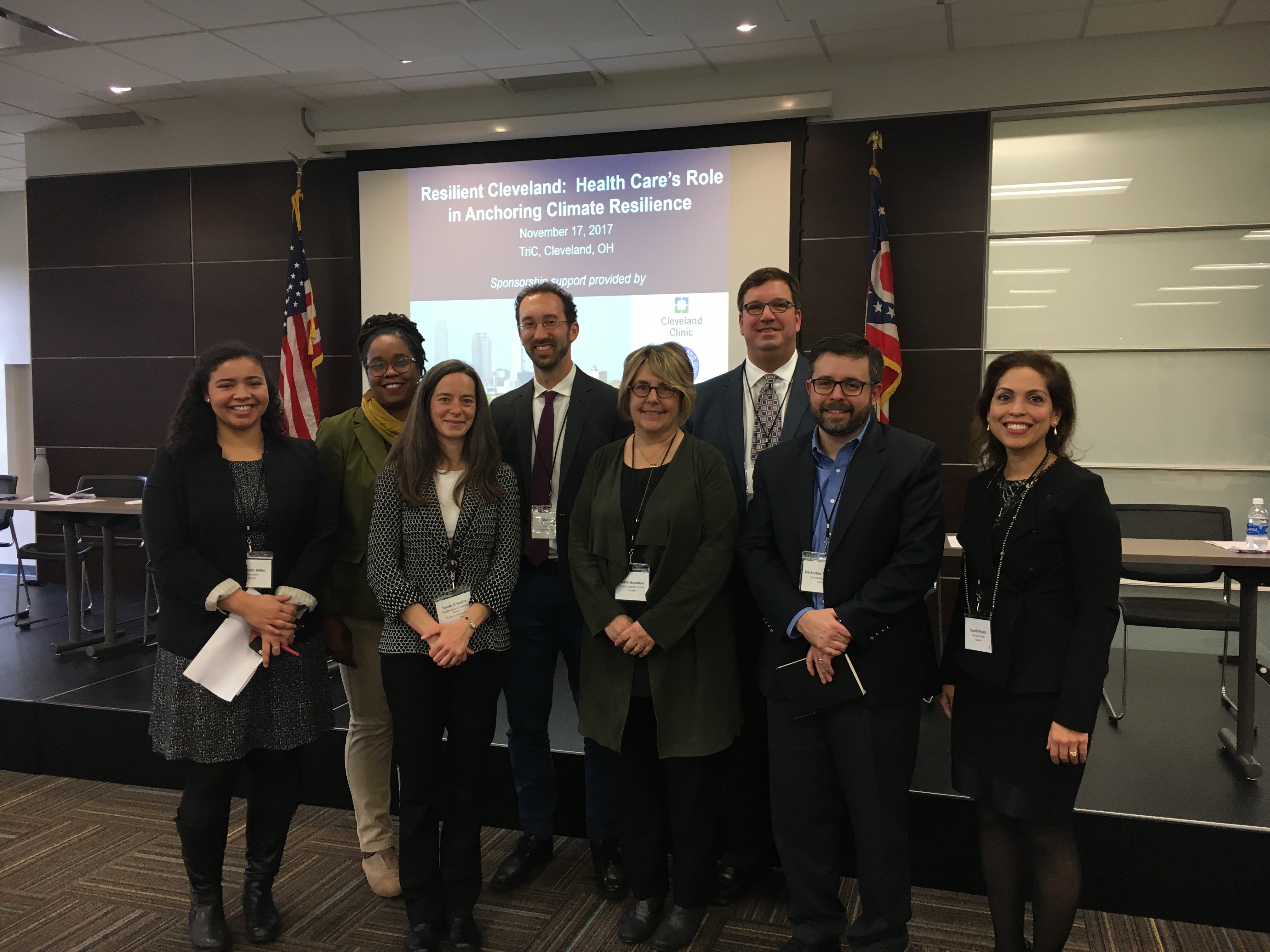Regional resilience summit in Cleveland a success

Opening panelists for the event from the second to the first row, left to right: Bianca Butts, Cleveland Neighborhood Progress; Matt Gray, City of Cleveland; Jon Utech, Cleveland Clinic; Elizabeth Miller, Ideastream; Sarah O’Keeffe, Heights Bicycle Coalition Board; Robin Guenther, Health Care Without Harm senior advisor, Nick Rajkovich, University of Buffalo; Dr. Sumita Khatri, Cleveland Clinic and American Lung Association.
The City of Cleveland, Cleveland Clinic, and Health Care Without Harm recently partnered to host a resilience summit focused on health care’s role in building climate resilience in the region.
“Participants were incredibly engaged, and everyone walked away with concrete action steps ranging from including the impacts of increased snow in the Climate Action Plan, to considering climate risks in regional planning work, to creating a collaboration between hospitals and neighborhoods to develop community-based projects for medical residents,” said Jessica Wolff, Health Care Without Harm’s climate and health program director. “We feel like this day will make a difference in building a more healthy and resilient Cleveland.”
The Nov. 17 summit brought together stakeholders from across the community, including health care, city government, planning agencies, academia, public health, and nonprofit organizations, to share different perspectives, discuss climate risk and preparedness, and build a network of individuals and organizations committed to working together for a healthy and resilient community. Findings from the day will be integrated into the update of Cleveland’s Climate Action Plan, which is currently underway.
During the introductory panel, Jon Utech, Cleveland Clinic Office for a Healthy Environment director, shared his reasoning for sponsoring the summit, emphasizing the need for collaboration and coordination to prepare for climate change: “We can’t do this alone,” he told the audience, “we need all of you in this room.”
The event was planned to be highly interactive, with significant time devoted to small-group discussions. Expert speakers gave a series of short “ignite talks” with the goal of providing food for thought and inspiration for action. They addressed issues such as emergency preparedness, the health benefits of trees, creating a bicycle-friendly community to improve air quality, and how microgrids can build energy resilience. Attendees also chose break-out sessions devoted to specific questions on climate resilience and shared new ideas generated by the talks.
“Extreme weather events make climate change real for people. You can see the uncle that was impacted, the impact on the neighborhood, the impact on the health care system,” Bianca Butts from Cleveland Neighborhood Progress, explained in her presentation on the Climate Ambassadors Program. “The awareness of these events creates an opportunity to communicate why climate change is important to the neighbor and the business person, not just city officials and engineers.”
Attendees also worked through a “shocks and stressors” exercise to simulate climate risks in Cleveland and to anticipate solutions to address these threats. Through the exercise, participants were able to develop plans for possible future scenarios, as well as build valuable working relationships with new partners.
The overall goal of the event was to drive coordination among participants to build community resilience, moving from information to action. Matt Gray, Cleveland’s chief of sustainability, told the group, “action, action, action – this is what this has to be about.”
At the beginning of the day, each person was asked to think about three small and three large actions they would undertake to better prepare their community for the impacts of climate change. The actions were shared in a final session. Some of the highlights included:
- Representatives from the Cuyahoga County Planning Commission identified integrating resiliency into master plans and inclusion of public health and climate change in community engagement strategies.
- A representative from a regional air quality group committed to making air quality a top-of-mind issue in Cleveland and to connect transportation, air quality, climate, and public health by quantifying the health impacts of driving in the region.
- A Cleveland Clinic representative committed to planting 1,000 more trees in an underserved neighborhood.
- A neighborhood climate ambassador outlined plans to capture video of local youth expressing their concerns about climate change and sharing the videos on social media.
In partnership with leading hospitals and health systems, Health Care Without Harm has co-hosted regional resilience events in Seattle (2016), Boston (2017), and now Cleveland and aims to host two summits in 2018. Given the significant threat posed by climate change to human health and wellbeing, these summits aim to integrate health and health care impacts into regional climate action and preparedness planning and establish area hospitals as anchors for community resilience.
For more information about Health Care Without Harm’s resilience work, contact Lauren Koch.
